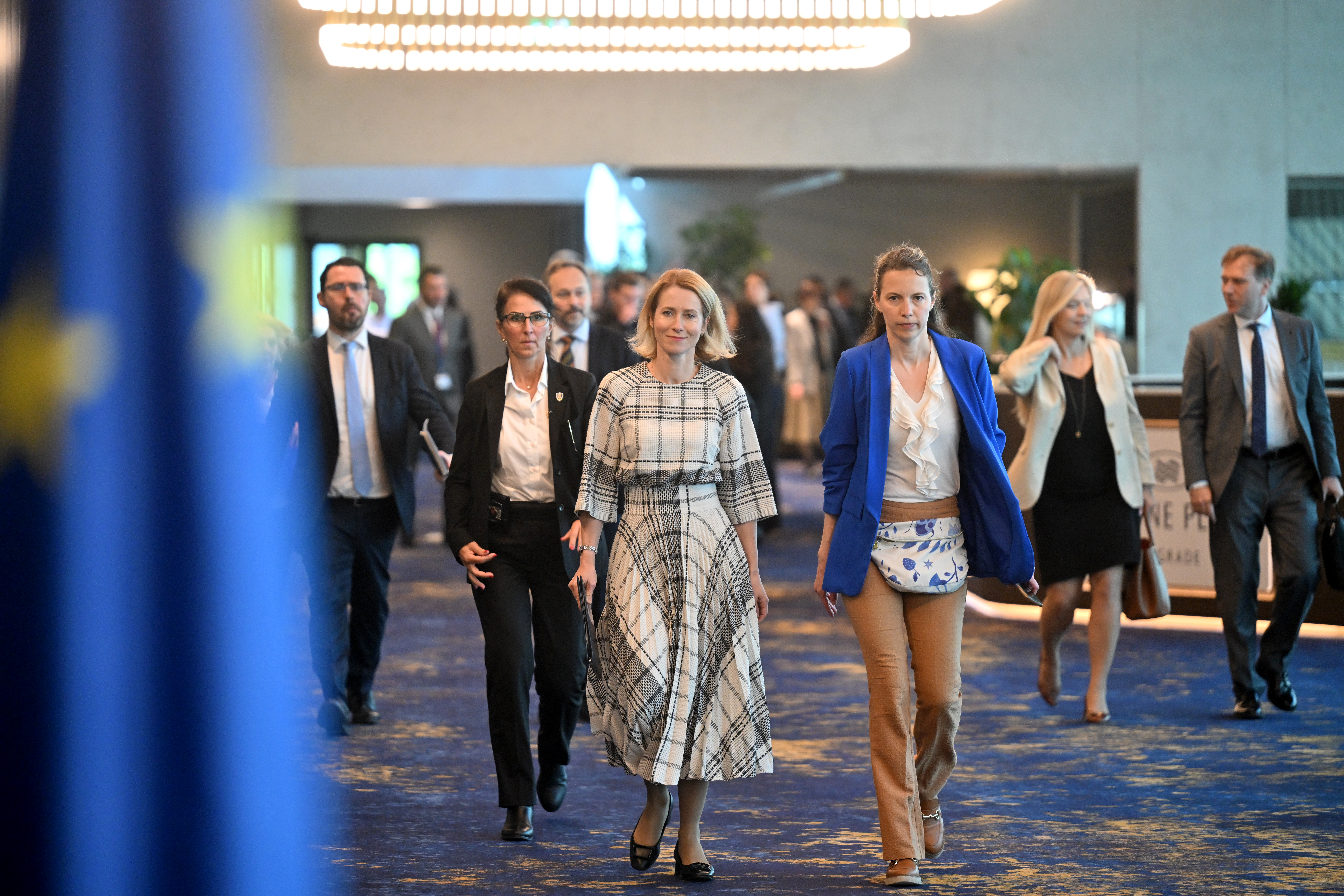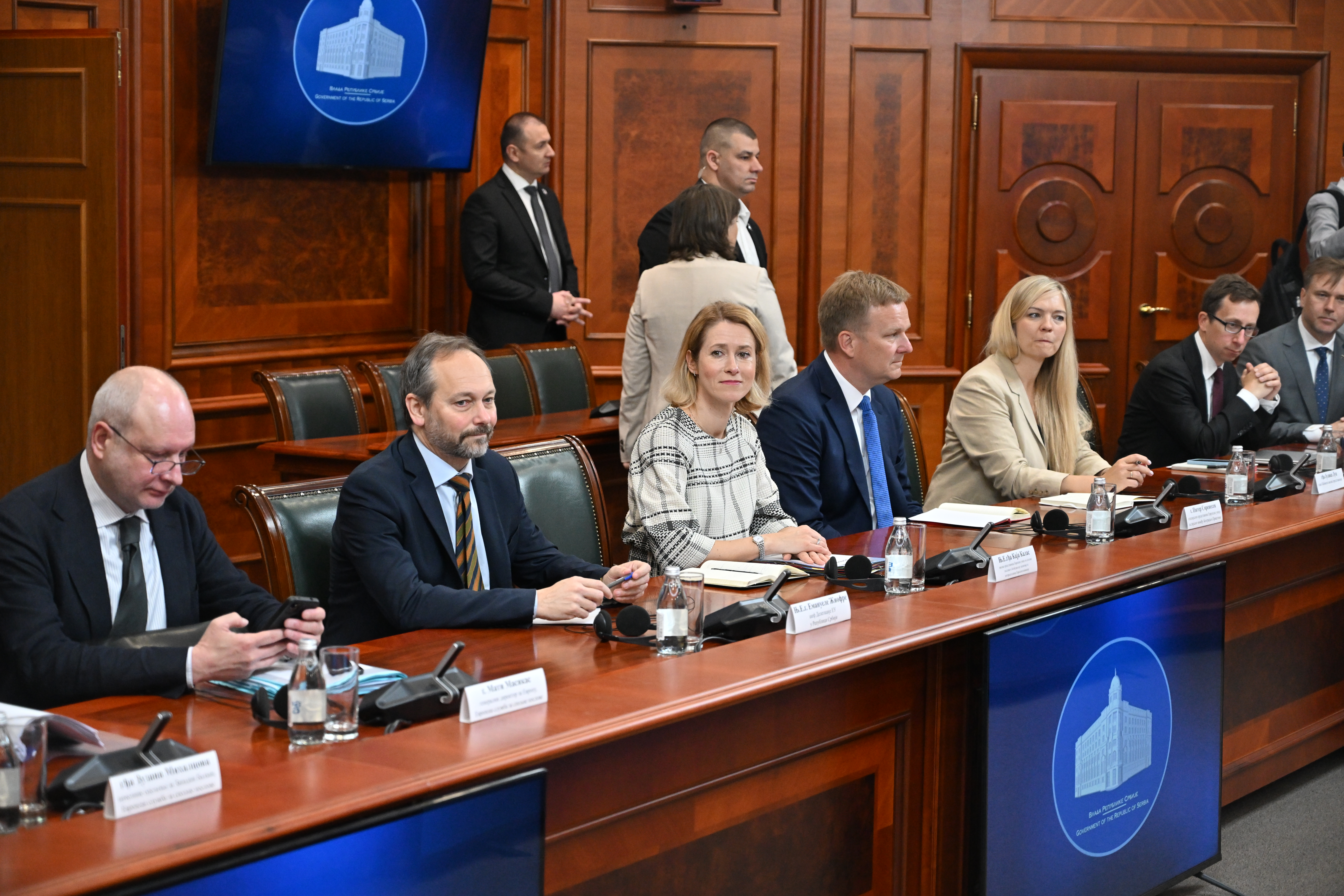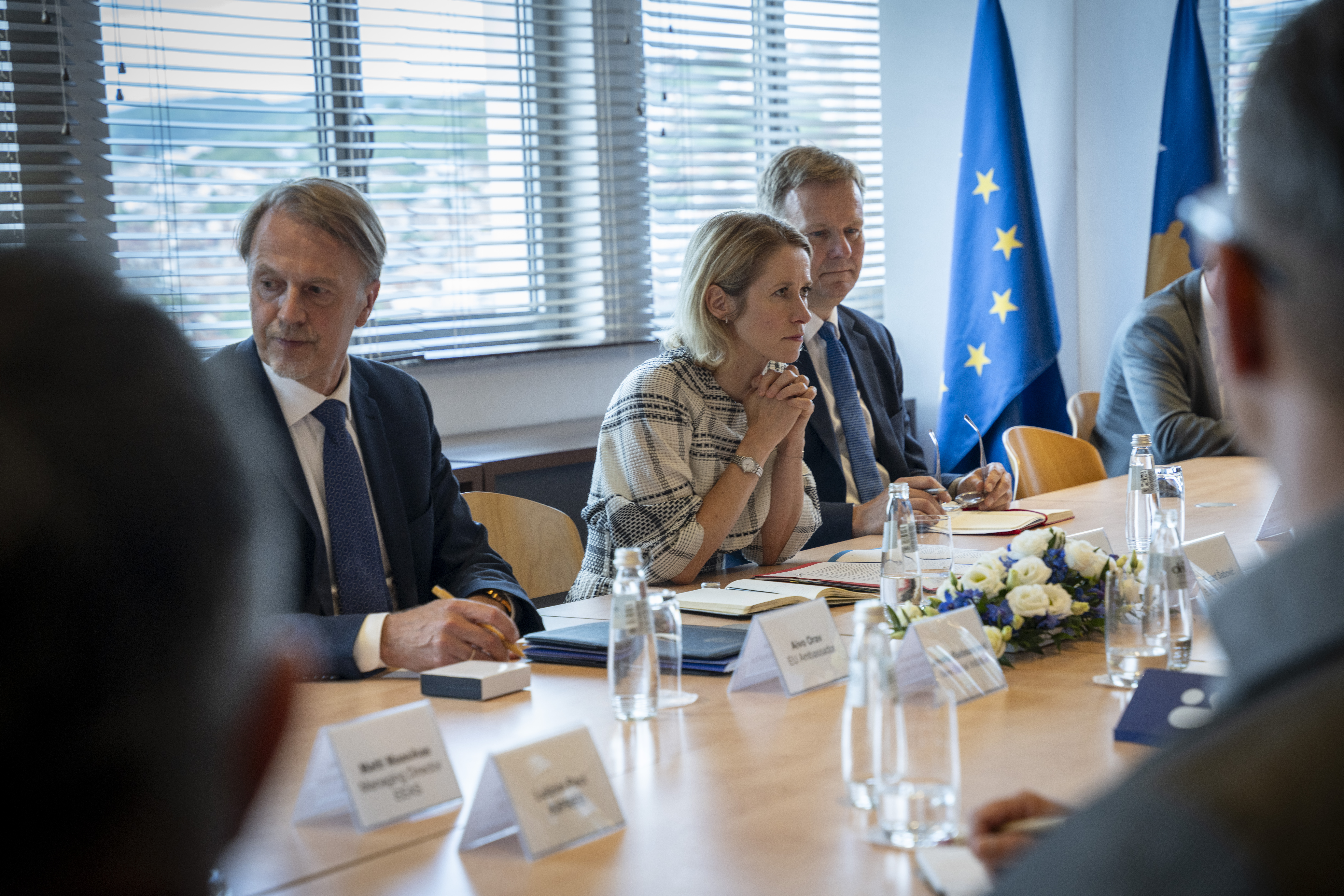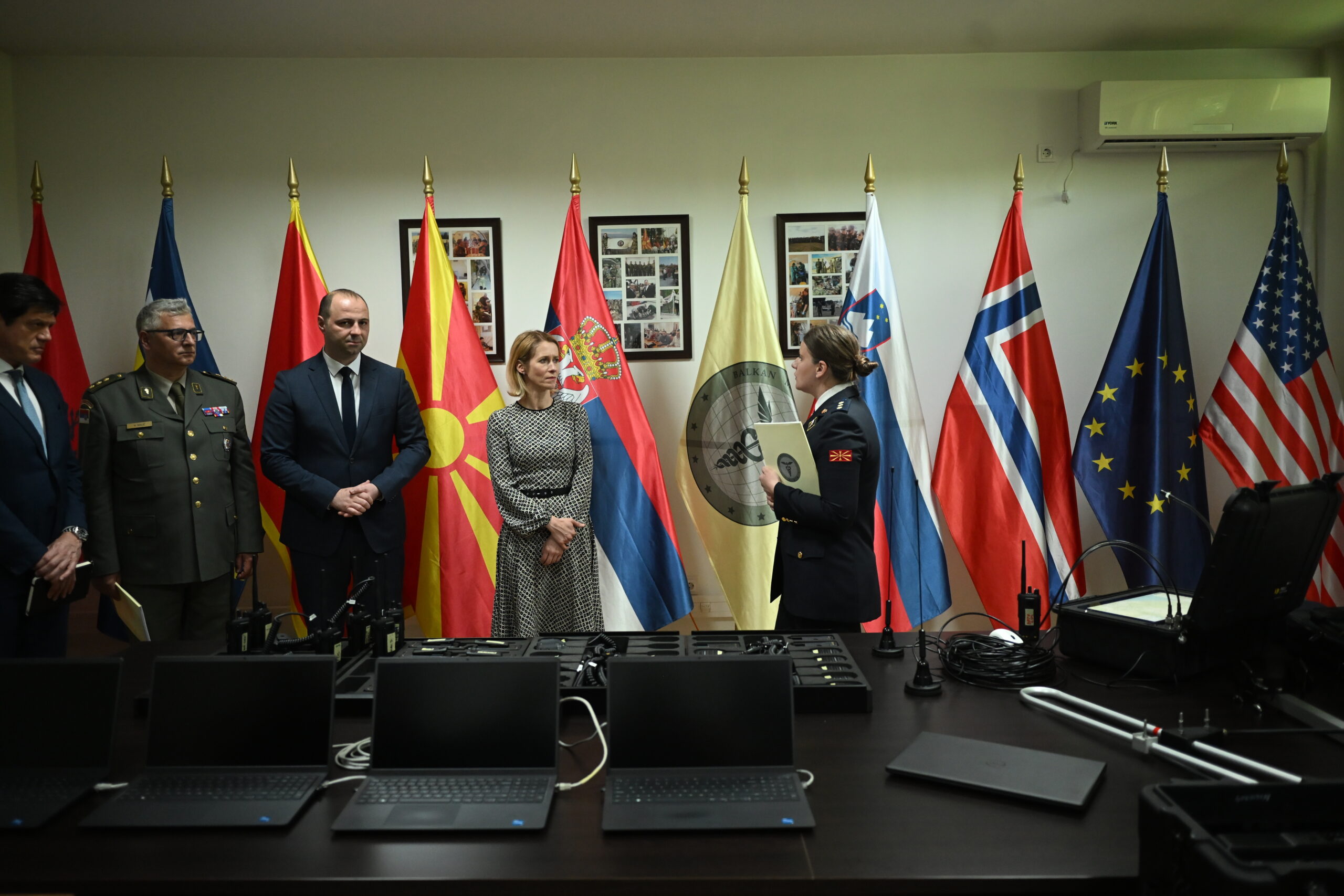
The EU High Representative for Foreign Affairs and Security Policy and Vice-President of the European Commission, Kaja Kallas, visited Serbia, Kosovo and North Macedonia on 22–23 May 2025.
“The Western Balkans are of strategic importance to the European Union. EU enlargement in this region is our most significant geopolitical project and also my personal priority”, said Kallas. The key messages she delivered during each meeting underlined that the EU expects accession – but that the path comes with clear obligations.
Serbia: No shortcuts on the path to the EU

In Belgrade, Kallas met with the country’s political leadership – President Aleksandar Vučić, Speaker of Parliament Ana Brnabić, and Prime Minister Đuro Macut – as well as opposition parliamentary groups, representatives of active youth organisations and civil society.In her statements to the media, Kallas stressed she had made it clear to government representatives that the EU wants to see Serbia making progress towards accession–this requires political leaders to implement reforms, clarify their strategic direction, and work on normalising relations with Kosovo, recalling that “There are no shortcuts.”, adding that “the best results come from restoring trust and relying on democratic principles”.After meeting with civil society representatives and hearing their calls for aspiration for justice and accountability – which are essential for Serbia to reach its full potential, she added that “their energy is needed to find the way forward.”

Kosovo: EU has begun to gradually lift measures
In Pristina, Kallas met acting Prime Minister Albin Kurti, leaders of major political parties, and civil-society representatives. She encouraged authorities to overcome the political deadlock and swiftly form a government.
“Leaders must set aside their divisions and prioritise Kosovo’s future. It is encouraging that EU membership is supported by the majority of Kosovars across the political spectrum. Kosovo belongs to the European family – but there are no shortcuts to EU membership”, stressing that Kosovo needs functional institutions capable of effectively implementing reforms.
“A key priority remains the normalisation of relations between Kosovo and Serbia. You are equal partners at the table. As the European Union and as High Representative, I will continue to support this process. The dismantling of Serbia-supported structures in the north undermines efforts towards de-escalation”, Kallas emphasised.
She confirmed that the EU had begun to gradually lift the measures introduced in June 2023, explaining that this decision opens the door to greater opportunities for Kosovo’s development and closer ties with Europe – but she also underlined that continued progress is conditional on sustainable de-escalation in the north.
The EU’s Growth Plan for the Western Balkans, she added, offers Kosovo “a major opportunity for gradual integration into the single market
During her brief stay in Kosovo, she also visited EULEX forces stationed there.
“Our EULEX mission continues to support the rule of law in Kosovo, but the current political framework and stalemate are holding Kosovo back. The European Union is ready to support you – but political leaders must set aside their divisions and focus on Kosovo’s future”, she reiterated.

North Macedonia: “You are a reliable partner”
After meeting the Prime Minister of North Macedonia, Hristijan Mickoski, Kallas reassured the country belongs to the European family and the EU stands by it on its path to integration. She highlighted that North Macedonia was the first in the region to sign a Security and Defence Partnership with the EU and the first to benefit from the EU’s Growth Plan for the Western Balkans.
“You are a reliable partner, and although the road to membership is not easy, my message is: stay the course. We know there are obstacles, but we discussed ways to overcome them. North Macedonia is the first regional beneficiary of the Growth Plan and the first to sign the Security and Defence Partnership with the EU. This partnership promotes joint action on Ukraine, hybrid threats, and counter-terrorism – and it shows that gradual integration works in practice. But we both want more, that is very clear. Your contribution to EUFOR Althea in Bosnia and Herzegovina is a clear example of your role as a reliable partner in regional security. I commend the strong efforts your government has made on its reform agenda”, Kallas said after the meeting.
Kallas pledged to North Macdonia that the EU would offer even greater support going forward – whether in strengthening the rule of law, fighting corruption, or modernising public administration.
In North Macedonia, together with the Minister of Defense, the Chief of General Staff of the Army of North Macedonia, the EU Ambassador and the EU Defense Attaché, Kallas visited the Balkan Medical Task Force (BMTF).
This was Kaja Kallas’ second trip to the Western Balkans since assuming the role of High Representative – in April she visited Montenegro, Albania and Bosnia and Herzegovina. Throughout this tour, she once again emphasised the need for regional stability and, in Serbia, stressed Serbia’s important role in ensuring regional stability, including in Bosnia and Herzegovina.

Kosovo: EU has begun to gradually lift measures
In Pristina, Kallas met acting Prime Minister Albin Kurti, leaders of major political parties, and civil-society representatives. She encouraged authorities to overcome the political deadlock and swiftly form a government.
“Leaders must set aside their divisions and prioritise Kosovo’s future. It is encouraging that EU membership is supported by the majority of Kosovars across the political spectrum. Kosovo belongs to the European family – but there are no shortcuts to EU membership”, stressing that Kosovo needs functional institutions capable of effectively implementing reforms.
“A key priority remains the normalisation of relations between Kosovo and Serbia. You are equal partners at the table. As the European Union and as High Representative, I will continue to support this process. The dismantling of Serbia-supported structures in the north undermines efforts towards de-escalation”, Kallas emphasised.
She confirmed that the EU had begun to gradually lift the measures introduced in June 2023, explaining that this decision opens the door to greater opportunities for Kosovo’s development and closer ties with Europe – but she also underlined that continued progress is conditional on sustainable de-escalation in the north.
The EU’s Growth Plan for the Western Balkans, she added, offers Kosovo “a major opportunity for gradual integration into the single market
During her brief stay in Kosovo, she also visited EULEX forces stationed there.
“Our EULEX mission continues to support the rule of law in Kosovo, but the current political framework and stalemate are holding Kosovo back. The European Union is ready to support you – but political leaders must set aside their divisions and focus on Kosovo’s future”, she reiterated.

North Macedonia: “You are a reliable partner”
After meeting the Prime Minister of North Macedonia, Hristijan Mickoski, Kallas reassured the country belongs to the European family and the EU stands by it on its path to integration. She highlighted that North Macedonia was the first in the region to sign a Security and Defence Partnership with the EU and the first to benefit from the EU’s Growth Plan for the Western Balkans.
“You are a reliable partner, and although the road to membership is not easy, my message is: stay the course. We know there are obstacles, but we discussed ways to overcome them. North Macedonia is the first regional beneficiary of the Growth Plan and the first to sign the Security and Defence Partnership with the EU. This partnership promotes joint action on Ukraine, hybrid threats, and counter-terrorism – and it shows that gradual integration works in practice. But we both want more, that is very clear. Your contribution to EUFOR Althea in Bosnia and Herzegovina is a clear example of your role as a reliable partner in regional security. I commend the strong efforts your government has made on its reform agenda”, Kallas said after the meeting.
Kallas pledged to North Macdonia that the EU would offer even greater support going forward – whether in strengthening the rule of law, fighting corruption, or modernising public administration.
In North Macedonia, together with the Minister of Defense, the Chief of General Staff of the Army of North Macedonia, the EU Ambassador and the EU Defense Attaché, Kallas visited the Balkan Medical Task Force (BMTF).
This was Kaja Kallas’ second trip to the Western Balkans since assuming the role of High Representative – in April she visited Montenegro, Albania and Bosnia and Herzegovina. Throughout this tour, she once again emphasised the need for regional stability and, in Serbia, stressed Serbia’s important role in ensuring regional stability, including in Bosnia and Herzegovina.
Please wait while your video is being uploaded...
Don't close this window!